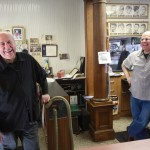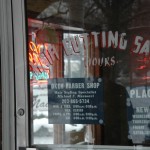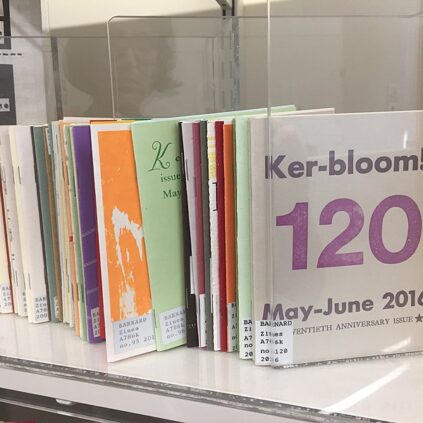
Placido Mastroianni cuts hair in a barbershop he calls a salon. “Salone means ‘you receive the people,’” he says. He takes a little off the top from any man who comes in. Men who don’t have much hair on their heads still have a lot on their minds. In the weeks before November 2, 2010, their minds were on the mid-term elections. And Mastroianni, like any good barber, was ready to comb out the tangles.
One customer calls Mastroianni the Walter Winchell of Whalley Avenue. Like New York’s old-time radio host, the New Haven barber seems to know what’s happening everywhere at once. But the comparison falls short. Winchell once ruffled his national audience by saying that President Truman “does not know what the h-e-double-l is going on.” Mastroianni, on the other hand, whose voice is as reassuring as his hands are deliberate, takes care not to prick anyone’s ears. He focuses through his terracotta-colored rims and snips head hair, ear hair, nose hair, and “these three hairs on the neck,” he tells a customer, “because it bothers me.”
Customers come to talk; Mastroianni does the listening.

Listening has long been his livelihood. As a boy working the fields of Amorosi, Italy, Mastroianni listened for approaching American bombers. School had closed for the war, and when the chores were done and the sky grew silent, he and his brothers became joyful vagabondes. They roved through the soldiers’ camp outside town, where they played soccer and sometimes shared an idle soldier’s single cigarette. On weekends, the children gathered to hear the war news at the village barbershop.
When Mastroianni immigrated to Connecticut at age 17, he strained to hear instructions spoken in English over the din of factory equipment. He listened well and, wanting to become his own boss, left the factory four years later to enroll in barber school. Cutting hair has made up for an education cut short by the war. Since 1953, he has listened to as many as four men an hour (indeed a barber must, to make ends meet) and has mulled over each day’s news during the slow spells. After 57 years of work, Mastroianni’s back has come to rest at a curve somewhere between its one-quarter stoop for tending to black curls, grey tufts, and white wisps, and its three-quarter hunch for reading about the 1970 election of an Italian-American mayor in New Haven, the 1983 bombing of the Marine barracks in Beirut, and the 2004 undoing of the Great Bambino’s curse on the Boston Red Sox. He looks up from the New Haven Register on his heavy desk. “All of a sudden, you sit here for hours, nobody comes in, you wonder, ‘What the fuck happened?’”
But the bells have always jangled again at the glass door, and each time, Mastroianni has risen to his feet to cut more hair, to listen to another side of the story. An American veteran once told of flying over Mastroianni’s village during the Second World War. He dropped bombs near the town, low on fuel and forced to lighten his load. Other customers have brought stories that have become part of Mastroianni’s own. He once listened carefully to the mother of two boys whose hair he cut as she described her sister’s imminent arrival from Italy. Mastroianni won over that sister not long after she landed; the boys are now his nephews.
…
On a morning in election season, the golden light on Whalley Avenue looks warmer than it feels, and the red and blue posters promise more than seems possible. Shaw’s Supermarket is boarded up, as is Minore’s Market, though only the first is out of business. Campaign signs totter on ground littered with chicken bones and empty single-shots of 70-proof Jeremiah Weed. BLUMENTHAL, Brains, Not $Buck$ and Brawns, lies belly up in mud.
Coming for “relaxing time” and his second haircut this month, Andy Esposito drives into town in his black Cadillac. He passes the For Sale signs that condemn century-old homes still on the block (Come See. . .Will Not Last), and turns into the driveway of the only one still well kept.
He drives past the bare earth where three bushes have been stolen from the front yard, parks in back, and enters the salon.
A purple awning leads customers up the stairs and into the baby-yellow clapboard home of Placido’s Hair Cutting Salon. Though floors and walls are now covered with silver-swirled gray linoleum, the house still has a hearth and mantle. The hearth is covered with damp neck rags, the mantle with pictures of customers. There’s a photo of a mother holding her son for his first haircut, and then another of her holding her grandson for his. The salon has occupied this living room since 1976, when Mastroianni relocated from the YMCA. Today, he shares the space with Mike Maraucci, who brought his barbershop from Chapel Street to Mastroianni’s address in 2001. The two share expenses, talk baseball, and occasionally give one another a quick haircut. Mastroianni likes his spare hairs cut short and Maraucci likes them cut off all together—shaved right down to a shine.
Esposito, who has been coming to Placido’s Hair Cutting Salon for 34 years, is the customer who called Mastroianni the Winchell of Whalley. “We talk a lot about what’s really happened in this country in the last fifty years,” he says. The talk gets hot. Esposito is an entrepreneur in protein powder. He takes pride in the value he provides for his customers, and offense at those who make money without offering customers anything of substance. His voice quickens with anger over “Wall Street fuckers,” then quivers with disgust when he describes a generation of “public-service assholes” who are too incompetent to straighten out the Wall Street types. Mastroianni never dismisses complaints yet never fully allows for pessimism either.
“But I thought he was the guy we like?” He stops cutting hair and leans his upper body away from Esposito’s head, as if to get a better view of his thinking.
“Well, he sold himself as one thing, and as soon as he got in, he did everything the way he said he wouldn’t.”
Mastroianni is working on the hair that hadn’t passed his survey. “Hmm,” he sympathizes, as he combs—clip, clip. “They all do that a little bit, don’t they?”
The old barber “knows how to light a fire under my ass,” says Esposito. But 850 haircuts into their relationship, Mastroianni has proven competent at keeping Esposito seated in that big green Belmont, no matter how hot his seat becomes. Esposito leans back into the chair, his aviator glasses removed, his eyes closed, and Mastroianni’s hand at the back of his head. He looks like Julius Caesar, and opens his eyes only for emphasis. “I like to have somebody take care of me; I’m usually taking care of everybody else.”
…
It’s warm enough inside for men to pull off Champion sweatshirts, roughened work vests, and Italian suits. Some go all the way down to undershirts, revealing gold chains and Catholic icons suspended in chest hair.
In barbershops, men drop their defenses.
An apron arrests their limbs, clippers cut close to their throats, and they sit face-to-mirror with their barber. He asks questions, he touches them with his hands, he listens. They don’t have much alternative. “Everything homemade is better,” says Mastroianni, “except haircuts.”
Men have feared and venerated barbers throughout history, as if with scissors and shaving cream barbers could take apart or put together one person or an entire political community. In Mastroianni’s birthplace, an ancient tyrant allowed only his daughters to shave him. When they got older, he mistrusted even their hands with a blade and made them burn off his five o’clock shadow with blistering hazelnuts. Another emperor worried that barbers might cut away his popular support. With dissent spreading in barbershops, he banned all barbers from Rome.
In Mastroianni’s adopted home, barbershops are part of democracy, or so it goes. In the American barbershop, all men (no women here)—some with dry hair and some with wet, some seated in heavy green chairs and others waiting in delicate pink ones—become equal, and the opinions they express carry equal weight. It is a place where a community can form shared beliefs. Wisconsin Governor Warren Knowles told Dick Cheney in 1966 that a good campaign should visit three places in every town: the Republican Party Office, the newspaper, and the local barbershop.
Mastroianni has cut hair for so long that those with whom he once talked politics have become the talk of town. Joe Lieberman ’64 LAW ’67 was Mastroianni’s customer for 10 years, when he had just finished at the Yale Law School and was working for a firm in New Haven. Lieberman was, as Mastroianni puts it, “destinated [sic] to become a politician.” He was special because he could talk to anybody, “anybody like me.”
But when Lieberman became attorney general and then senator, his blonde hair became gray, and he stopped sitting where Mastroianni could reach him.
Today, the barbershop democracy governs less. Political campaigns—including Dick Cheney’s 2000 and 2004 vice-presidential campaigns on the Republican ticket—visit more Internet blogs than barber chairs. And while Richard Blumenthal was attorney general, Mastroianni’s best access to him was through a staff lawyer, who reported that Blumenthal’s senate campaign became so broke its managers were making fliers on personal printers (no $Buck$ is right).
Mastroianni himself has gotten slower and quieter in his shuffles around the barber chair. He knows he has nothing to gain by changing a customer’s opinion, only business to lose. He used to be insistent and center-right. Now he’s on the left, but you wouldn’t know it. Mastroianni works around his customers. They sit in the center.
Even a careful eye can’t pick out Mastroianni in a picture from his 1967 return to styling school. “It’s im-pos-si-ble! I was a different man.” He was there learning to cope with long hair and left-wing politics, both of which put a lot of other barbers out of business—the kids just weren’t coming in for the JFK cut. A decade later, Mastroianni learned never to hang political posters in his barbershop. When he promoted mayoral challenger Ben DeLieto in 1977, customers who supported the incumbent protested, and all his customers got more city parking tickets for parking near opposition sidewalk signs. “People don’t want opinions,” he says. “They want haircuts.”
Shared opinions in the barbershop might be impotent to change policy, anyway. Most of Mastroianni’s customers have moved out of the city and cast their ballots in suburbs like Woodbridge and Orange.
“I see the reason,” says Mastroianni. “You’re working like a dog all your life, you’re trying to make something. All of a sudden you’ve got a beautiful place, nice school system, and it changes. The property goes down, the school system goes down. So what do you do? You run! If you got wings, you run.”
Now it doesn’t matter whose side the barber is on, if it ever did. People, or at least politics, won’t be changed by Mastroianni’s opinions. But people don’t come to him to be convinced what to do; they come to be consoled about what they no longer can.
…
“How ya doin’, John?”
“Just barely treading water.”
BaZRRRR. The clipper and the din of the double-cassette radio excuse Mastroianni while he comes up with a question. What the customer needs to express isn’t always clear, but each will soon say what he must. Mastroianni’s silence lets his customers speak, and his simple affirmations encourage them to say more.
Mastroianni asks a man with sparse brown hair about his brother’s pitbulls, and the man soon opens up about his brother’s drug problems. Marucci, also a practiced listener, asks a near-bald father about a son’s bachelor’s party. After telling what the strippers “made me do” (“Oh, they made you!”), the father talks disapprovingly of his future daughter-in-law.
Sometimes, the barbers help the men retreat into their pasts. There are the war stories of Robert Wallick, who discovered Amelia Earhart’s briefcase; Jim Vaneris, who flew the Memphis Bell with his best friend from Tennessee; or Jeffrey Somner, who ran into an assistant barber drafted out of the Marucci’s old barbershop at Basic Training in Camp Grant, Illinois, and got his hair cut.
There are games that must be ritualistically replayed. One customer reckons with his mistakes on the field when Yale lost to Harvard, 29-29. A hulking man relives tackles he made in high school as Mastroianni cuts his bangs, and his shadow head-butting nearly brings his eyes into contact with very real shears. But Mastroianni doesn’t let that happen. He rarely brings his customers back to reality, unless they want to bring themselves. In this case, disability distorts the former football player’s sense of proportion, and once Mastroianni has washed the man’s head (an uncommon rite brought to an end with “Up, Sir!”), Mastroianni helps him identify the cut wet hair that has fallen onto his tongue. “Brown? Then it must be yours!”
Mastroianni may be a born listener, or perhaps just a too-busy barber. Tufts and curls take so much attention that Mastroianni must ask more questions than he answers. And when he’s combing to measure his next cut, the easiest question to ask is one that explores something further what his customer has said. Like a good therapist or a good parent, Mastroianni listens—he knows to focus with full attention (sometimes there’s not much hair there to busy him), acknowledge feelings with a single word (“No!?”), give feelings a name (preferably an Italian one: “So you’re saying he’s a socialista?”), and grant wishes in a fantasy. After his haircut, the disabled former high school football player barrels into Mastroianni with excessive force. “You are strong today, Brucey!” For the 77-year-old man, it may not feel like a fantasy. But for Bruce, one more tackle, twice each month, may make a difference.
…
When Mastroianni’s customers get around to talking politics, they do so as a release from other frustrations. They talk about things no one can change, it seems, as a way to forget the difficult things that they must change themselves. The talk isn’t a sign of collective empowerment anymore, but of an individual powerlessness that everyone shares. Mastroianni’s customers don’t want political conversation, but rather a chair from which to sound a long complaint.
A young man comes in with gumboots, jeans that could catch wind, and a Sean Jean jacket that must have been kitten soft before it went through the wash. He has dark hair, and lots of it.
“I want it real short, short short short! You know, Caesar-like.”
“I see,” Mastroianni flicks on the clippers. “You want to be free, not a slave to your hair, right?”
Mastroianni lets the soft-faced man move from “Platonic, you know, not sexual,” to “child support,” to the failing grades his teenage son is getting in school. He tires of talking until Mastroianni awakens him with a change of subject.
“So the economy’s got to change, huh?”
His cheeks alight with energy, but he soon sinks back into cold anxiety. The middle class just can’t compete with the money backing these politicians. Mastroianni stops. The man’s head protrudes like the point of an iceberg from the black and ochre sea of his apron, a sea-foam napkin at his neck. Mastroianni seems unable to size up what’s beneath.
“Well, you know, we have to talk about it. We just can’t think about it.”
Photography: Libbie Cohn


